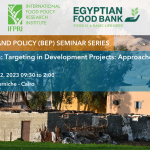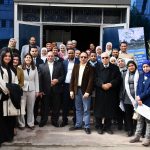SFSD, EFB, and IFPRI are excited to announce a forthcoming session as a first the second in the Bridging Evidence and Policy (BEP) Seminar Series. This upcoming session will take the form of a roundtable discussions, gathering experts and development implementers around the theme of “Targeting in Development Projects”. Targeting eligible beneficiaries in governmental and non-profit development programs is a challenging endeavor that requires a deep understanding about the different methodologies, and which is suitable for each program.
Russia Terminates the Black Sea Grain Initiative: What’s Next for Ukraine and the world?
The deal, put in place almost a year before, was scheduled for its fourth renewal. Within hours of the announcement, Russia launched a missile attack on the port of Odesa. The following day, Russian missile attacks on key Ukraine grain handling facilities sent wheat futures prices to their largest one-day rise since February 2022. A cargo insurer operating under the agreement reportedly suspended its coverage of Ukraine Black Sea grain shipments.
The Russia-Ukraine Conflict and Global Food Security
When Russia invaded Ukraine in February 2022, sparking fears of a global food crisis, IFPRI responded rapidly to the need for information and policy advice to address the crisis. From the first moments of the conflict, a new IFPRI blog series provided critical information and insights into the impacts on food security, caused by rising food, fertilizer, and fuel prices and trade disruptions, for vulnerable countries and regions.
Institutionalizing an Environment-Economic Policy Modeling Framework in the Ministry of Agriculture and Land Reclamation (MALR)
The Climate Change Information Center (CCIC) in the Ministry of Agriculture and Land Reclamation (MoLR) in collaboration with the International Food Policy Research Institute (IFPRI) conducted a one-week training course on the International Model for the Policy Analysis of Agricultural Commodities and Trade (IMPACT). The training took place at the Climate Change Information Center (CCIC) between 29 January and 2 February 2023. more than 2o of MALR'S researchers received the training on the IMPACT model.
Vacancy: Research Analyst
The International Food Policy Research Institute (IFPRI) seeks a Senior Research Assistant for a one-year, renewable appointment in its Egypt Office. The Senior Research Assistant will have a Master’s degree or its equivalent in Economics, Agricultural Economics, Statistics or closely related fields, and a minimum of 3 years’ work experience. The successful candidate will work with senior research staff in evaluating programs and policies, with a focus on social protection and agriculture interventions in Yemen and other research support activities related to IFPRI’s work in the Middle East and North Africa region.
- « Previous Page
- 1
- …
- 9
- 10
- 11
- 12
- 13
- …
- 27
- Next Page »





